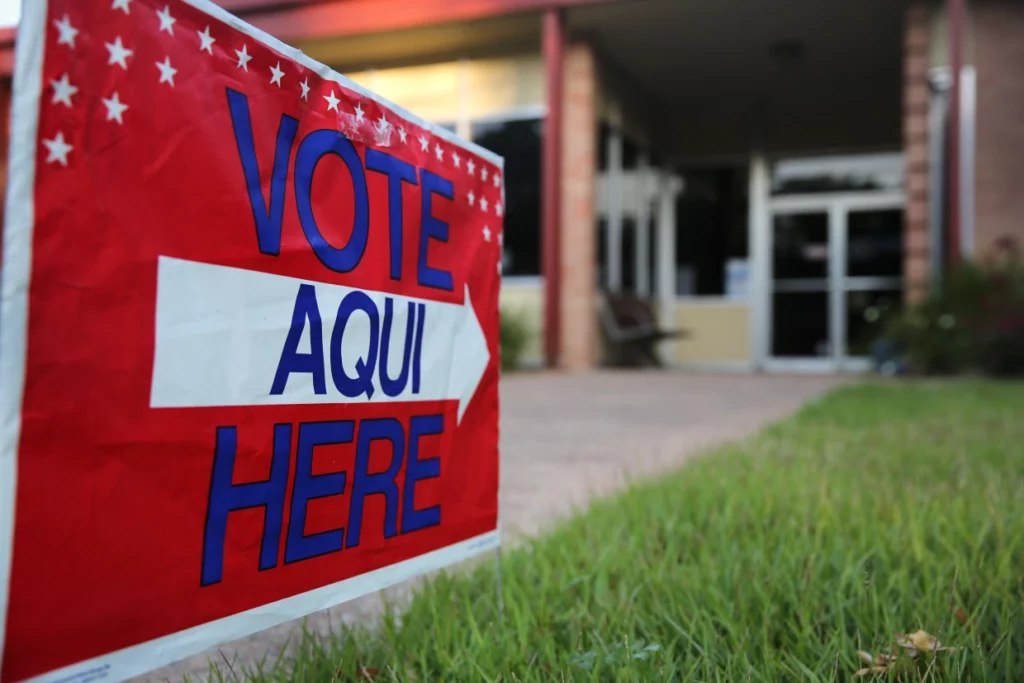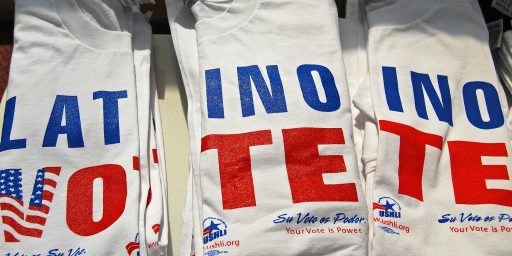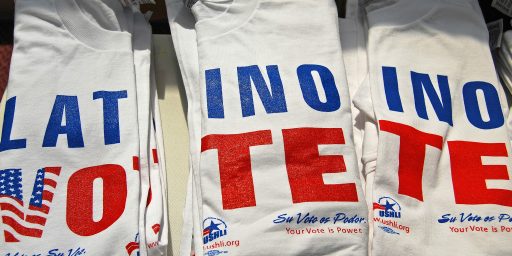The Elusive ‘Latino Voter’
They're a bloc but also not.

The Atlantic‘s Kelli María Korducki wants us to know that “America’s Latino Future Is Here.”
With the midterms less than three weeks away, the “Latino voter” is back in the national spotlight. But Democrats and Republicans alike still don’t seem to understand this crucial—and heterogeneous—group of voters.
Alas, after reading her piece, I’m not quite sure what she wants us to take away.
In the weeks leading up to a major election, Latino-voter headlines cluster like woodland mushrooms after an October downpour. A sampling from just this week: “We’re Not All Democrats” (The New York Times),”The Dangers of Ignoring the Latino Vote This November” (The Nation),”Republicans looking for gains with Latinos have lots of catching up to do on TV” (Politico),”Democrats and Republicans aren’t cutting it for Latinos, poll finds”(Axios). So established is the timing of these pre-election stories that a person could set their calendar to the cadence.
The prevailing threads in the discourse have likewise become familiar.Pundits report who’s spent what to woo the coveted cohort; others wrinkle their noses at candidates’ last-ditch “Hispandering” along the way. Others remind us that there is no such thing as a monolithic Hispanic American voting bloc, let alone a tidy “Latino vote.” Then the election passes, and the discussion pauses until the next federal campaign cycle, when a few updated polling figures are swapped in.
Yes, political reporting is often formulaic and predictable.
I have followed this pattern closely not because I’m a politics reporter or expert, but because I am a Latino voter—one of the estimated 34.5 million eligible to vote in this U.S. election. Insofar as there’s a “typical” member of this group, in many ways, I’m it. Like the majority of eligible Hispanic American voters, I am a U.S.-born citizen. I fall neatly within the largest age grouping of eligible Latino ballot-casters (30 to 49, represent!), and I live—and vote—in the state with the ninth-greatest share of Latino voters in the union. I’m also bilingual, bicultural, and—in the sense that I am frustrated with both parties—bipartisan.
She’s a Democrat. Got it.
Demographic affinities aside, what I suspect I have most in common with other Latino voters falls within that last point: a throb of vague irritation. We comprise the fastest-growing group of voters in the country, the “sleeping giant” of the American electoral equation. Every 30 seconds, a Latino in the U.S. becomes eligible to vote. And yet, Latino voters are seemingly regarded—then discarded—as a curiosity, a strategic nut to crack during election run-ups.
See also working-class voters. Suburban soccer moms. College-educated voters. Youth voters. Security moms.
Why? One, because the idea that this giant is sleeping is wrong: We’re already the second-largest voting bloc in the country, helping decide elections.
So, this is fair. But I’d also argue that this is mostly a function of the fact that Latinos are not a voting bloc. Blacks are a voting bloc, consistently voting more than 90 percent Democratic. As Korducki herself acknowledges, that’s not the case with Latinos.
Two, although we are labeled as a giant, we are persistently, and mistakenly, treated as a niche demographic.
This is reflected in, for instance, displays of incredulity over Latino voters’ views on immigration—a significantly lower-priority issue than, say, the economy and health care. It’s also apparent in rhetoric across the political spectrum, from first lady Jill Biden’s declaration this summer that U.S. Latinos are as “unique as … breakfast tacos” to the right’s “Great Replacement” fearmongering.
Jill Biden shares her husband’s penchant for gaffes. But, yes, it’s a mistake to treat Latinos as niche voters who all think the same way, primarily prioritizing identity issues rather than pocketbook issues.
More accurate is understanding Latinos as a microcosm of American identity. We embody the range of values and beliefs that define this nation’s political landscape, ideals seeded in the colonial histories of our ancestral Latin American homelands.
But, again, that would seem to beg for Latinos not being treated as a bloc.
As the Northwestern University history professor Geraldo Cadava wrote in the March issue of The Atlantic:
When [Latinos] vote, we aren’t just casting ballots about health care or education policy. We are expressing political identities that have evolved over centuries—for and against expanding empires and nation-states; for and against more radical forms of egalitarianism—in ways that don’t always fit neatly into the rhetoric of the left-right divide.
That seems to be the opposite of what Korducki has been arguing. Regardless, this just boils down to Latinos are people, with complex motivations that often don’t line up into a coherent theme. Like, well, the rest of us. It means Latinos can’t be targeted as Latinos but rather based on their individual circumstances.
Nearly one in five people in this country is Hispanic American. We’re a sociopolitical behemoth, yes. But we’re not outsiders, and we’re not born into any one political party—we’re Americans, as complex as any others. Candidates and elected officials would do well to acknowledge this truth—for the good of their political prospects, but more importantly, for the country itself.
Again, I think that’s right. But I don’t think you can have it both ways here. Either Latinos/Hispanics (highly overlapping but distinct drops) are a “sociopolitical behemoth” or they’re simply ordinary citizens who can’t be lumped together.
Oddly, the latter was conventional wisdom once upon a time. Most notably, Cuban Americans were historically treated as a distinct bloc that tended to vote Republican because they were devoutly anti-Communist.




I really don’t believe there is an Hispanic or Latino voting bloc anymore than there is a German-American voting bloc. Judging by my DIL’s family, by the third generation, everyone is pretty well assimilated into the American culture. I know it is a sample size of one but my DIL’s family went like this. Gen 1: crossed border (about 70-80 years ago), settled in, worked hard, had 6 daughters, They still dont’s speak English very well. Gen 2: daughters were educated, some got college degrees, many taught school, were bilingual, got married, had children, etc. Gen 3 (my DIL): Engineers, pharmacists, nurses, professionals. Knows some Spanish but mostly Tex-Mex. Moved to urban areas, married, often outside of ethnic group, solid middle class.
In other word, the American success story. They have a wide range of political and cultural views. They are not a bloc. They vote their individual needs.
Some time back, the LA Times wanted to avoid using the dreaded “Latinx” word. They polled their Spanish-speaking readers for a preferred adjective. An overwhelming majority chose “Mexican-American”. I’m sure that you would get a different answer in south Florida.
I don’t know if anyone here is following the current furor unfolding in Los Angeles, where several Latino City Councilmembers were caught on audio making disparaging and racist comments about Black and Oaxacan people.
https://www.latimes.com/california/story/2022-10-19/kevin-de-leon-no-im-not-resigning
What it demonstrates is that Latinos suffer from the same prejudices as anyone else, and most importantly for American politics, are just as drawn to nativist and racist messages as anyone else.
In some circles, Nury Martinez would be viewed as the exotic foreigner and maybe assumed to be the maid by white bigots.
But that doesn’t stop her from thinking she is somehow in the upper caste and sneering at Latinos that she considers beneath her.
Last election cycle there was a lot of handwringing over the shift towards Republicans in the Rio Grande Valley with people wondering what the Democrats had done to “lose” these people. Maybe they were never “ours” to lose. Maybe Latinos, like everyone else, are spread out across the political spectrum from very progressive to reactionary right wing.
I think the only reason we see such bloc voting by Black people is the power of racism causes even the most rightwing Black person from voting Republican.
I still find it very weird that educated elites, especially on the left, still tend to think of Hispanics and other broad ethnic categories can or should be a bloc like black voters are. But this shows historical ignorance – there are clear reasons why the black vote is much more uniformly partisan than other ethnicities.
And even that is changing over time.
@Andy:
It is weird, but the reason is simply that believing that Latino voters are a block similar to Blacks allows the left their preferred narrative. Even the White lefts perception of the Black community is filled with misunderstanding and assumptions.
@Andy: The white left has a mindset of “you face the same struggles, so you should all be the same” when it comes to Latinos, where the Latinos are defined by the racism against them.
It follows in with “brown people,” but there’s a lot more realization that different brown peoples are going to be different — Arabs, Mexicans and Indians have a lot of common struggles, but are from different cultures with different values.
I want to say that this mindset goes all the way back to Marx and “workers of the word, unite!” We should recognize the things we have in common (oppression at the hands of capital/racists/patriarchy) and have a big kumbaya moment where we come together and overthrow the various oppressors.
I don’t think it’s an entirely wrong mindset, but it’s often an oversimplification. And with Latinos in particular has a bit of a racist “you all look the same anyway” energy, although it’s more paternalistic than that.
As far as Blacks go, though, Republicans are only really making inroads with the mentally ill ones. Ye née Kanye West, and Hershel Walker being this year’s examples.
@Gustopher:
That explanation makes sense.
@Chip Daniels:
In the other direction, some years back a number of Black aldermen in Chicago were caught on a live mic talking about the increasing Latino population in that city. Remarks that can’t be repeated on a family blog.